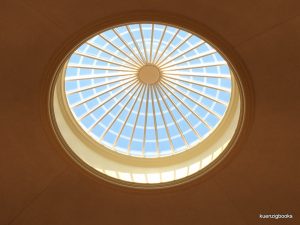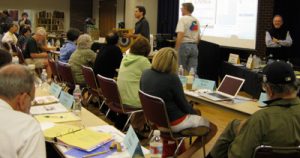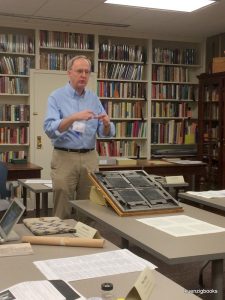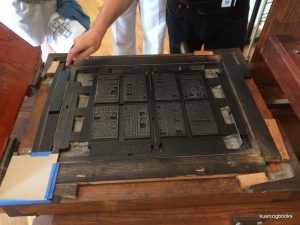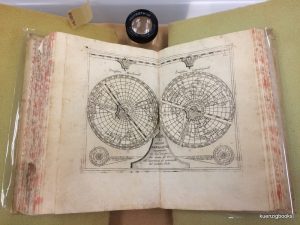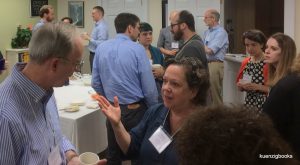As a proud survivor of a school adept at churning out NIH (Not Invented Here) graduates, the idea of needing outside sources of knowledge doesn’t come naturally. I was taught to study hard (“drink from that firehose, drink!!”), use your natural talents, and you’ll succeed. And chances are your invented method will be better than what already exists. Heck, I built a software company and sold it on that basis. So in the beginning I thought it would work here too… it is only books after all, right? How wrong I was.
As it turns out, bookselling has traditions and specialized languages that go with the objects we buy, cherish, and find new homes for. And while some things (hopefully) don’t require school – being fair, open-minded, honest and trustworthy – some do, and they are important. Especially to the best collectors, institutions, and other dealers who can read the language. It turns out that a big part of your credibility (and hence sales and success) comes from knowing how to converse with others of like mind and background.
Some traditions and even some of the specialized vocabulary can be self-taught. Read bookseller biographies. Carter’s ABC for Book Collectors. Ask questions and actively solicit feedback. Study colleague’s trade show booths, catalogs, and salesmanship. Learning from customers (many of whom will know more than you do). Even plying a few booksellers with food and drink until they spill the beans about the secret sauce can work. But it will only take you so far.
If you at times feel lost, reach a financial plateau, or wonder why that collector or dealer gets a funny look in their eye when you’re talking about a book, stop. It’s a major clue. You might finally consider getting a formal education in the art and science of bookselling. Let me explain my experience and why I think it is a smart move.
My first major educational foray was the 2009 iteration of CABS (Colorado Antiquarian Book Seminar). It only took 14 years of procrastination. I had all kinds of excuses why not to attend – too busy, loss of income, the moon was in the wrong phase, [insert your favorite excuse here], etc. All seemed Very Valid at the time. But eventually I took the plunge, even discovering a list of scholarships to apply for to and help offset lost income.
CABS was a huge win…the week long program reminded me why I was in the business to begin with. I built relationships with like minded people. What I learned had a positive impact on my business (it grew 20% a year for several years). Many aha moments changed my perspective on the whole world of bookselling. Veteran booksellers shared from the soul, answering any question no matter how “basic” it seemed. It was a no-judgement zone.
At CABS I learned about Rare Book School, founded by Terry Belanger in 1972. CABS seemed designed to walk booksellers, collectors, and others through many of the industry basics (and not so basics). As their website notes it “provides an opportunity for leading specialists to share their expertise and experience with booksellers, librarians, and collectors in a comprehensive survey of the rare book market, both antiquarian and modern.”
Rare Book School appeared different – more focused on in-depth courses on certain subjects. It sounded very interesting. I resolved to continue my education.
Procrastination won again, but for only six years this time. I mostly worried about looking too stupid next to all those curators, specialists, and booksellers.
Then I attended:
In 2015: I-20 Book Illustration Processes to 1900, taught by Terry Belanger. Awesome. [with the help of a scholarship]
In 2016: I-35 The Identification of Photographic Print Processes, taught by Ryan Boatright and James M. Reilly. Awesome. [ on my own dime ]
And this year, 2017: G-20 Printed Books to 1800: Description & Analysis taught by David Whitesell. Awesome. [ with the help an IOBA scholarship ]
[ Yes, Scholarships also exist for Rare Book School.] [ Notice the lack of procrastination after 2015. I finally learned a valuable lesson. ]
Everyone always asks what a course REALLY does for you. I’ll attempt to illustrate that for this year’s wonderment. So what did I learn in G-20 ?
My goal was to learn more about hand-press era books (books printed before about 1800). I’ve sold the occasional hand-press era book (Archimedes’ Archimedis Syracusani Philosophi Ac Geometrae Excellentissimi Opera from 1544, Magnitskii’s Arifmetika from 1703, etc etc). But in each case I had gone to institutions to conduct a side by side comparison to see if what I had was “right”. I didn’t know how to read format, signatures, collation, and in some cases pagination. Was the book complete? And if not what might be missing (just a blank page, or perhaps something more important?). I knew that both online and my reference library had answers. But I couldn’t read them. I also knew from reading library catalogs, bibliographies, and dealer catalogs that collation, format, and pagination were important. But the established “self-learning texts” including Gaskell’s New Introduction to Bibliography and Bowers Principles of Bibliographical Description were terrifyingly opaque.
Enter David Whitesell (our teacher) who was fantastic. He approached everything with a passion and enthusiasm that was infectious. He has the kind of dry humor that I really enjoy. And he answered every question as many times as needed for everyone to get it. He demystified the subject, and made it fun. How fun? I’m looking forward to re-cataloging the older books I have with some anticipation (and trepidation at how poorly the existing entries must look). We learned about:
- How book printing operations work
- What role each person in the printing shop has, and how they work together
- How paper is folded and marked so that the printer and binder get all the pages in the right order
- What the clues are that allow us to determine the original paper sizes, and the resulting format of the book (ever wondered what octavo, quarto, folio, etc meant?)
- Why we should care about watermarks and what they can tell us
- The difference between laid paper and wove paper and what they can tell us about the book in hand
- What deckled edges are and why they’re useful in bibliographical description
- Why the preliminary and the final pages of a hand-press era book are often the most difficult to understand
- And how to read a collation to determine if the book we’re looking at makes sense or not
- What is an ideal copy and why should we care?
- Many, many other things.
We got lots of hands on experience through demonstrations and even trying it ourselves:
-
- Printing our own pamphlet on a replica of a hand-press era book:
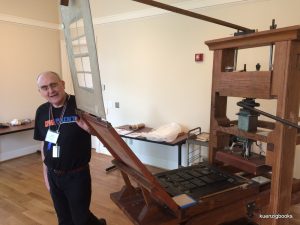
- Learning the basics of bindings, how a book is constructed, and what the binder does
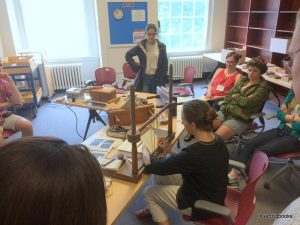
- And examining dozens of examples for each phase of the course which helped convert our “theoretical” knowledge to “practical”
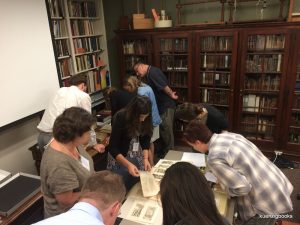
- Examining Very Special examples from the Rare Book School and University of Virginia collections
- Printing our own pamphlet on a replica of a hand-press era book:
The students were fantastic. Everyone was there to learn, had a great attitude (helping each other out, sharing discoveries, stupid mistakes as we learned, and excitement). From what I could tell everyone had done the advanced reading (Very Important for this course). At the periodic snack breaks goodies were served, conversations flourished, and we got to know each other better. And perhaps most importantly it helped us reset before the next period. Lunch and dinner at the many great local restaurants were fun as (some of us anyway) tried to be a little more sociable than we might otherwise be.
In short, Rare Book School was fantastic. I am now much more comfortable handling hand-press era books. I have a basic knowledge of formulas, how to collate and paginate books, recognize signatures and other skills necessary to work effectively with hand press era books. I’ve already been asked by a colleague who knew I attended to interpret and apply a collation formula and was able to do so without breaking a sweat. I’m looking forward to revising my descriptions of hand-press era books and cleaning up any errors. And of course applying this new-found knowledge to buying and selling a new and exciting mix of books.
For anyone concerned that they’ll be out of their depth, the students in our course were from all different backgrounds. The teachers and students are incredibly down to earth, AND incredibly well versed in their fields. A rare combination. The faculty are patient and genuinely interested in your success. Your own interest in the material goes a long way towards any short-lived difficulties you might experience in class. And the time you invest is very much worth any time or potential lost revenue you might experience.
My sincere thanks to the IOBA who gave me a scholarship to this year’s course. The scholarship really helped defray the cost of attending and made it possible for me to attend and share some of my excitement on my return.
My thanks also to everyone at the Colorado Antiquarian Book Seminar and Rare Book School for their passion, enthusiasm, and dedication. Without their focused support, the world we live in would be a much less vibrant place. Check them both out. I guarantee you won’t regret anything other than perhaps wishing you’d done it years before.
Hmmm….now what to take next year….


